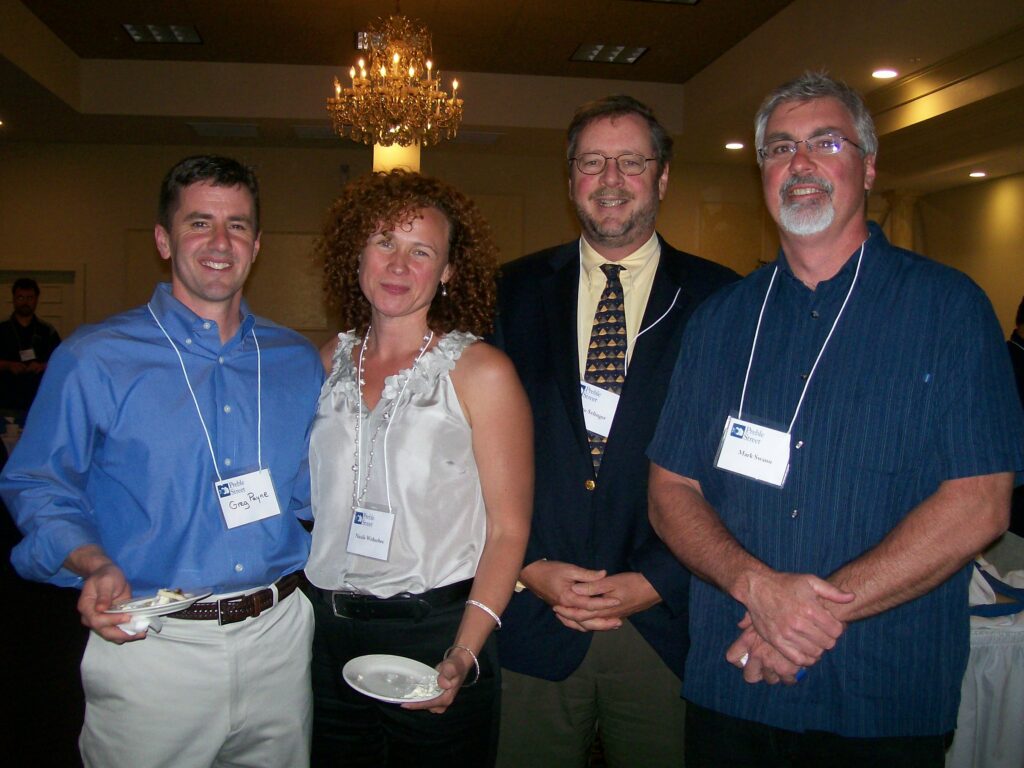How did you get involved with Preble Street?
I came to the Preble Street board in 2005 via Stone Soup, a Preble Street subsidiary whose mission was to train folks in the culinary arts. When I joined the board, I think I was one of four lawyers. At first, I wondered what I could contribute. The answer came pretty quickly when the Site-based Housing First program, Logan Place, started to become a reality. Since I know a little bit about real estate law and affordable housing, I realized I might have something to offer.

Greg Payne, Nicole Witherbee, Cito Selinger, and Mark Swann at the Preble Street 2012 Annual Celebration
What do you do when you’re not at Preble Street?
I’m an attorney. For more than 30 years, my focus has been creating and preserving affordable housing and helping redevelop and repurpose historic structures. I work closely with affordable housing developers and lenders. Our firm did the legal work for Logan Place, Florence House, and Huston Commons. When I’m not working or doing Preble Street stuff, I’ve been known to wander off on multiday hiking trips with a couple of college friends. I also devote some time to renovating an early 1900s camp in western Maine.
There are a lot of nonprofit organizations in southern Maine. Why do you think Preble Street stands out in the crowd? What is it that Preble Street does better than anyone else?
Preble Street is the gold standard for effective program design and service delivery. The organization has a long history of stepping in and taking over programs from failing organizations, redesigning them, finding funding, and making it all work. The pandemic brought home Preble Street’s ability to adapt to rapidly changing circumstances. The entire way the organization delivered services
had to be reimagined, practically overnight. The results speak for themselves: the Food Security Hub is a great example of how to reimagine a program and make it function better than it did before. I have to recognize the amazing work Preble Street staff do on a daily basis. We on the board know this is exhausting work and the staff’s dedication to the mission and to serving clients with compassion is just terrific. They make a difference and improve lives every day.
We know why that is important to the people we serve, but why is that important to you or to others who might consider supporting us?
Folks want to know their social service donation dollars aren’t just going to a good cause; they want assurance that the money will be well-spent and will improve people’s lives. I’ve been on a lot of boards over the years. The length of my tenure here, and that of other folks on the Preble Street board, speaks highly of the organization. It shows a dedication to the mission. The way I would put it to anyone asking is that I wouldn’t have stuck around so long if I felt the organization wasn’t effective in reaching its goals.
What are the biggest challenges Preble Street faces looking to the future? Or what are the specific projects/aspects of Preble Street that you are committed to?
The combination of a lack of affordable housing and a rise in substance use disorder is nearly overwhelming, and I don’t see it improving meaningfully in the near, or even long, term. The other harsh reality is that the current funding for housing initiatives is likely not to last. While the current political situation at the state level is favorable, that may not last forever. Being a housing person, my interest is in seeing more Site-Based Housing First projects developed. We know they work and have an enormously positive impact on people’s lives. It’s hard to stitch together all the capital needed to build these projects, but it’s far harder to find year-over year resources to cover the cost of providing the needed services we all know make these projects successful.
Being a nonprofit board member can be very demanding and time-consuming. What makes it all worthwhile?
The Preble Street board is simply terrific. I’ve always said I’ve never attended a dull Preble Street board meeting. When I was doing trainings in nonprofit governance, I used to say, somewhat in jest, there are three rules for board members: Show up, pay attention, and ask questions. That happens at every Preble Street board meeting. Board members know their role, and they ask thoughtful questions, discuss things thoroughly, and make good decisions. It’s been a great privilege to serve on this board and help in a small way to advance the mission of Preble Street.
Read more...

Seeing the possibilities
Mark Swann’s remarks from the Preble Street 50th Anniversary Celebration Thank you to every single person who is here tonight. I am so blown away by seeing how many of you came out tonight to help us celebrate 50 years. I am really proud of all of the work that we’ve done at Preble Street.

An evening of hope, joy, and compassion
On June 17, 2025, hundreds of people who share in our mission and values gathered to celebrate Preble Street’s 50th Anniversary! We knew it would be special, and the amount of hope, joy, and compassion swirling through the event was truly something to behold. Every person present brought an energy that added to the magic

Celebrate the 50th anniversary of Preble Street! Tuesday, June 17, 2025
Please join us to honor and celebrate the 50th anniversary of Preble Street! GATHER with supporters, former and current staff, volunteers, partner organizations, and community members to CELEBRATE all that we have accomplished in the last 50 years to find solutions for homelessness and hunger in Maine. This event is free to attend. Advance registration is requested. EVERYONE

